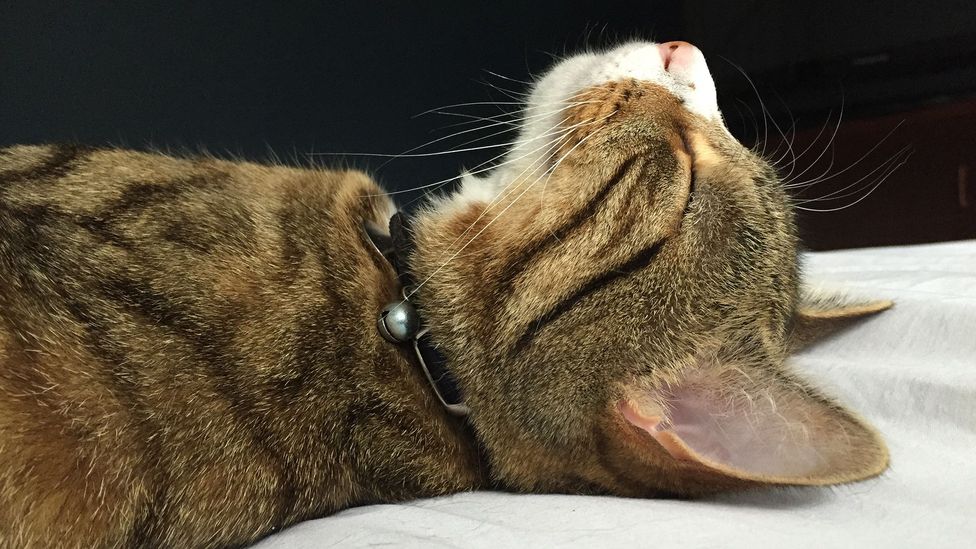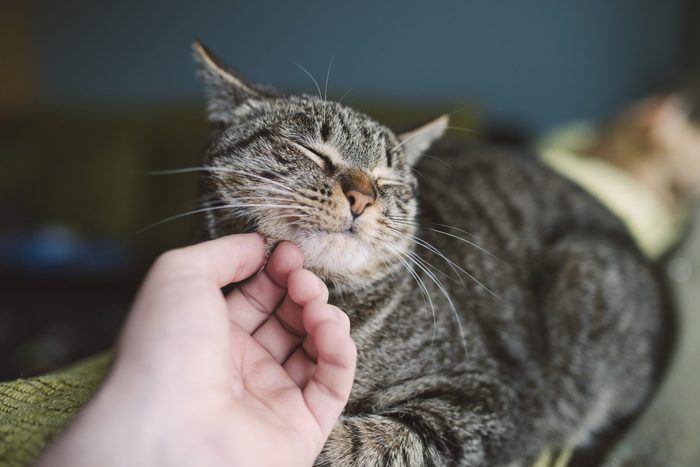If you are a pet parent, you are familiar with the purrs and meows of your feline baby.
When you start petting your cat, you almost always expect them to purr.
When you hear them meow, you can bet they are seeking your attention.
You may also be aware of the occasional growl and hiss when your cat is upset.
These noises are fairly common and they help you know how your cat is feeling.
But there are other not-so-common noises from cats that are worth knowing—like when your cat’s purr starts sounding gurgly.
Reasons Why Your Cat’s Purr Sounds Gurgly
Your cat’s purr is usually a low, rumbling sound that signals contentment and happiness.
But if your cat’s purr begins to sound more like a gurgle, it could be a sign that something is wrong.
Here are some possible explanations for why your cat’s purr might sound gurgly:
1. Your cat has an obstruction in its throat
If your cat has an obstruction in their throat, it will cause them to make gurgling noises when they try to purr.
This is because the obstruction is blocking the flow of air and causing the sound to be muffled.
The obstruction could be caused by a foreign object, such as a toy or bone, which your cat has swallowed.
It could also be caused by an inflammation in the throat, such as laryngitis.
If you think your cat has an obstruction in their throat, take them to the vet right away.
2. Your cat has a cold
Another possible explanation for why your cat’s purr sounds gurgly is that they have a cold (feline upper respiratory infection).
When cats have a cold, they may make gurgling noises when they breathe due to congestion in their respiratory system.
Common cat cold is caused by a virus and is highly contagious.
Some of the symptoms include a runny nose, watery eyes, and sneezing.
If your cat has a cold, take them to the vet so they can prescribe the appropriate treatment.
Related Post: Do Cat Colds Go Away On Their Own?
3. Your cat has heart disease
If your cat has heart disease, it can cause their purr to sound gurgly. This is because heart disease can cause fluid to build up in the lungs, which can make it difficult for cats to breathe.
Heart disease in cats is caused by a variety of factors, including genetics, age, and lifestyle.
Signs of heart disease include a decrease in activity level, weight loss, and coughing.
If you think your cat has heart disease, take them to the vet so they can run some tests and determine the best course of treatment.
4. Your cat has laryngeal paralysis
Laryngeal paralysis is a condition that affects the muscles in the larynx, which can cause your cat’s purr to sound gurgly.
This condition is typically caused by nerve damage, and it can make it difficult for cats to breathe.
The condition often happens in older cats, and it can be a sign of another underlying condition, such as cancer.
If you think your cat has laryngeal paralysis, take them to the vet so they can run some tests and determine the best course of treatment.
5. Your cat is old
As cats age, they may start to experience health problems that can cause their purr to sound gurgly.
For example, older cats are more likely to develop heart disease or laryngeal paralysis.
If your cat is getting up there in age, it’s essential to take them to the vet for regular check-ups so any health problems can be detected and treated early.
6. Allergic reactions
Allergic reactions can also cause your cat’s purr to sound gurgly.
If your cat is allergic to something in their environment, it can cause them to have difficulty breathing.
Common cat allergies include pollen, dust, and certain types of food.
If you think your cat may be having an allergic reaction, identify the allergen and remove it from your home or their diet.
You should also take your cat to the vet to be treated for their allergies.
7. Nasopharyngeal polyp
Nasopharyngeal polyps are growths that can form in the nasopharynx, which is the upper part of the throat.
These growths can cause your cat’s purr to sound gurgly. These growths are caused by a variety of factors, including allergies, infection, and injury.
If you think your cat has a nasopharyngeal polyp, take them to the vet so they can be treated.
But the commonest cause is a build-up of mucus in the nasopharynx. Nasopharyngeal polyps can be treated with medication or surgery.
8. Tracheal collapse
Tracheal collapse is a condition that occurs when the trachea (windpipe) collapses. This condition can also cause your cat’s purr to sound gurgly.
Tracheal collapse is often caused by a build-up of mucus in the trachea.
The trachea is made up of rings of cartilage. When there is a build-up of mucus, it can put pressure on the cartilage and cause it to collapse.
Tracheal collapse can only be diagnosed by a vet, so it’s a good idea to have your cat checked.
Other Cat Sounds That Sound Like Gurgles

It is also possible that your cat is making other noises that are easy to mistake for a gurgle.
For instance, a stertor noise may sound like a gurgle and this is typically caused by obstructed airwaves.
Brachycephalic breeds (breeds with flat faces) like Persians are known to suffer from this condition.
Stridor is another sound that may sound like a gurgle and it is mostly caused when your cat’s airwaves become narrow. This could be as a result of constructed airwaves or as a result of an ailment.
Your cat may also have whizzing or hissing sounds and that is often as a result of a cold.
When your cat has a cold, the membranes in their nose swell up and this obstructs airflow.
The sound is often worse when your cat breathes out and it should go away when the cold clears.
If you notice any of these other sounds, you should take your cat to see a vet as they may require treatment.
Summary
So, why does my cat’s purr sound gurgly?
Well, if you are concerned that the gurgling purr sound means your cat is in pain, you can rest easy because they are not.
That said, the cat might be uncomfortable and it is best to have the issue sorted out.
Also, as we have already seen, the gurgling sound almost always indicates some form of ailment.
So, even though your cat may not be in pain, it is best to nip the sickness in the bud before it gets worse.
For the most part, your cat should recover from the treatment and her purrs return to normal in no time.

Hi! I am Eleanor Price. I started this website after my cat, Louie, almost died from a case of botulism (a type of food poisoning often caused by bacteria that grow on food items). Turned out that my cat’s diet was the problem. I have made it my duty to provide the best information and recommendations about everything cat lovers need to know about their felines’ health and wellbeing. My goal is to find the most informative content on anything feline-related and share it with fellow hardworking kitty lovers.

